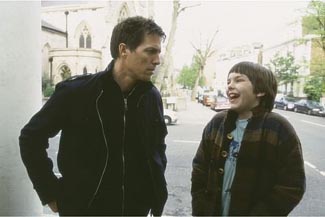
|
Jennifer Turnock's Top Ten Lists for 2002
I first read Nick Hornby's novel About a Boy in late 1999 and loved it to the point of being annoyingly evangelical about it to friends, family, casual acquaintances, strangers at the supermarket, what have you. ("I didn't even know Bruce Hornsby wrote a book, but sure I'll read it if you'll just shut the hell up about it.") So after a torturous two and a half year wait, I had prepared myself for the disappointment that would no doubt result when the movie version inevitably failed to live up to my overly high expectations. But much to my black little pessimistic heart's surprise, the adaptated screenplay by Peter Hedges and the brothers Weitz actually improved on the book in many ways (other than the overly sentimental final scene). Hugh Grant has a tough role that requires him to be shallow, selfish and let's face it - a bit of a dick. But Grant admirably straddles that delicate line between charming rogue and villain that is so crucial to the overall movie. Nicholas Hoult gives an unsentimental performance as Marcus, and the chemistry between the two leads is spot on. Lastly, my compliments for the nicely thought out set design, costumes and props that reveal so much about the characters and their inner lives before they even open their mouths to speak. Igby Goes Down has the benefit of both excellent acting and intelligent, crackling dialogue. Director/writer Burr Steers shows us a collection of emotionally damaged, off-kilter misfits reluctantly bound to each other by literal and symbolic familial ties. The lead character, Igby (brilliantly played by Kieran Culkin), is constantly getting his ass kicked by the other characters, emotionally and sometimes even physically. However, in Igby's case, the audience can see why, since he often acts like a stubborn, self-destructive little brat. I've seen people complain that the movie is flawed because it has no sympathetic characters. I'd argue that while most of the characters do and say things that aren't particularly likeable at times, they still evoke our sympathy as we watch their struggles to come to grips with their lives and the pain that has been inflicted on them. Steers doesn't have the same affection for his eccentric characters that a director like Wes Anderson does, but he does an excellent job of evoking pathos within the context of a very darkly funny movie. The Quiet American is currently in theaters and I highly recommend it. Michael Caine has never been better and the movie itself is thought provoking, well directed and beautifully shot. Unlike a more conventional Hollywood movie (or, for that matter, the first film adaptation of Graham Greene's novel by Joseph Mankiewicz), director Philip Noyce is not afraid to explore the moral ambiguities of the two main protagonists as they compete to "win" the same woman. The love triangle itself is compelling largely because Caine is able to vividly convey the high stakes riding on the outcome of this contest for his character. However, the real story is in the subtext that reflects the competition to determine who will shape the future of the country of Vietnam itself and the often disastrous consequences that can result from even the best of intentions. Lastly, Y Tu Mama Tambien is part road trip, part coming of age drama, part teen sex romp and even part "The Graduate meets How Stella Got Her Groove Back." On one level the movie is laugh out loud funny and the two teenage leads are like Beavis and Butthead's non-union Mexican equivalents (and I mean that in the best possible way). On another level, director Alfonso Cuarón uses seemingly throwaway background details to tell a hundred little stories about Mexico itself, both its spirit and its sorrows.
Special Recognition Award #1Least Attractive Miramax Star to Get a Good, Hard Screwing from Harvey Weinstein This Year: Michael CaineMichael Caine gave one of the finest performances of his career in Miramax's The Quiet American, a movie that was nearly never released theatrically at all. In what has now become a well known story, Miramax Dictator-for-Life Harvey Weinstein pulled the scheduled fall 2001 release indefinitely after the events of September 11th, because he was concerned the movie would be perceived as being too critical of the US. The release was pushed into the traditional dumping grounds of January, where it would have been in the illustrious company of quality movies featuring a sinister tooth fairy and Poochy, the rapping kangaroo. Caine eventually shamed Miramax into a very limited Oscar qualifying release and he's since received an onslaught of critical acclaim. However, Caine may have won the battle but lost the war. Harvey apparently doesn't like being the bitch in the relationship, and so far, he appears to be be withholding the full support of Miramax's legendary Oscar-buying marketing machine.
Special Recognition Award #2Best Repeat Performance at Spotting a Future Multi-million Dollar Meal Ticket: Rita WilsonProving that sometimes lightning does indeed strike twice, Rita Wilson took a frizzy-haired comedian with next to no prior experience, provided a little extra special nuturing and encouragement and voila - one Big Fat Greek Wedding later and she's the proud co-owner of a multi-million dollar pie. Note to MoJo and Zora - this is how it's done in the big leagues.
|
||||||||||||||||||||||||||||||||||||||||||||||||||||||||||||||||||||||||||||||||||||||||||||||||||||||||||||||||||||||||||||||||||||||||||||||||||||||||||||||||||||||||||||||||||||||||||||||||||||||||||||||||||||||||||||||||||||||||||||||||||||||||||||||||||||||||||||||||||||||||||||||||||||||||||||||||||||||||||||||||||||||||||||||||||||||||||
Saturday, January 10, 2026
© 2006 Box Office Prophets, a division of One Of Us, Inc.